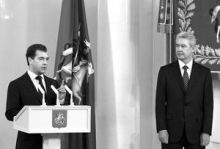The intrigue surrounding the appointment of Luzhkov’s successor, which was almost obscenely long, is over. The selection of Moscow’s new mayor was carried out in accordance with the Byzantine traditions of Russia’s corridors of power. Formally, all rules were observed. The United Russia party submitted their suggestions in the form of a short-list of candidates to President Dmitry Medvedev. The head of the state promised to quickly consider it and make a quick decision. However, to the surprise of some governmental and opposition political experts, the speedy procedure was much protracted. This confirmed the well-known truth that the struggle between the entourages of the tandem’s two luminaries is getting worse rather than better. The stakes are too high in this bureaucratic game, and its finale will have long-term consequences. It is of personal importance not only for both men in the tandem, but for many people, from Moscow to Vladivostok.
When the president, deep in thought, was making the staffing decision, sources close to the decision-making center, usually anonymous, frequently pointed to Sergei Sobyanin as the future mayor of the capital. In May 2008 he took the post of the leader of the government’s appartus. He controlled the execution of the decisions of the cabinet of ministers, staff, preparation of the prime minister’s speeches, and was a vice-prime minister in addition. Sobyanin himself treated his possible appointment as the capital’s leader without any enthusiasm, quite reasonably considering it a kind of demotion. Nevertheless it is him that the president chose, voluntarily of following persistent recommendations. There are reasons to believe that it was the search for a replacement that delayed the long awaited appointment, as they had to find a proper candidate for a very important post in the heart of the governmental machinery.
This is a much more difficult task than picking candidates for the post of the capital’s mayor, for all its importance and significance.
Generally, the transfer of Sergei Sobyanin to the capital in November 2005 to the post of the head of the presidential administration was quite symbolic. Before that Vladimir Putin selected staff exclusively from the second capital. People from Petersburg took almost all important posts, not only in the governmental and presidential machinery and special services, but also in leading corporations. Appointing Mikhail Fradkov, a previously obscure official involved in foreign economic relations, as prime minister on March 5, 2004, became the first sensation. He was not from Petersburg, but he had some connection with the special services anyway. Sobyanin didn’t correspond to the previously acceptable criteria for staffing appointments. He was not from Petersburg, he didn’t study and didn’t work with Putin, as he had nothing to do with the special services. He possessed other merits — the infinite devotion to Putin and equal remoteness from Moscow’s and Petersburg’s groups. If one adds a huge efficiency and complete reticence, the choice of the then president of Russia is not surprising.
The tough task of tackling the heritage of Luzhkov, and being the top leaderships eyes and ears in the capital, awaits him in Moscow. The question is whose? The premier’s or the president’s?
In this sense, appointing Vyacheslav Volodin for the vacant post of the head of the governmental administration is even more symbolic. It also shows the influence of the premier, his style in recent staff decisions. Though formally it was the president who appointed him for this post. Volodin is also not from Petersburg, he didn’t work for the special services. The fact that before the appointment he was occupied exclusively with the party activity in United Russia became an additional argument in his favor. He is a newcomer to the governmental corridors and is completely dependent on the premier. There was one more factor, technical at first sight: appointing Volodin, an outsider, didn’t require any substantial movements in the bureaucratic machinery. This way the established balance wasn’t exposed to an unnecessary additional ordeal.
Putin did not interfere in the conflict between Medvedev and Luzhkov. Though rumors about Luzhkov’s disgrace spread long ago, the premier publicly supported the then mayor. Moreover, he did so after Luzhkov angered Medvedev due to his ill-timed vacation, when Moscow’s surrounding were in flames, which was broadcast on television. However, it was not Moscow burning, but the region, and Luzhkov had no impact on it. Moreover, the highest leaders of the United Russia party and its Moscow organization supported Luzhkov, and behind it one could feel the premier’s influence. Already after the resolution, the premier dropped an unclear phrase about how it was Luzhkov’s own fault.
Many experts regarded the mayor’s resignation as a victory of Medvedev, but this conclusion seems to be a little premature in light of ensuing events. Putin yielded to the president and gave him a possibility to save his face, but he was richly compensated for this. The appointment of two of his followers for the important posts shows his serious attempts to reinforce his position before the approaching presidential elections. This will have an important impact on both groups of influence, in both the Kremlin and the government, and further along the entire vertical of power. The latest appointments should still be regarded as Putin’s revenge, but only for today. For example, Sobyanin is known for betraying his patrons in Tyumen and the Khanty-Mansiysk autonomous district. He always joins up with stronger leaders. If the situation changes, it will not be a problem for him to change the tack. Volodin’s bureaucratic weight is rather small, and it won’t be difficult for him to switch sides either. At present one can say that the ball moved to Putin’s court. So far is impossible to say whether it will stay there for a long time. Moscow has even more secrets than before.








